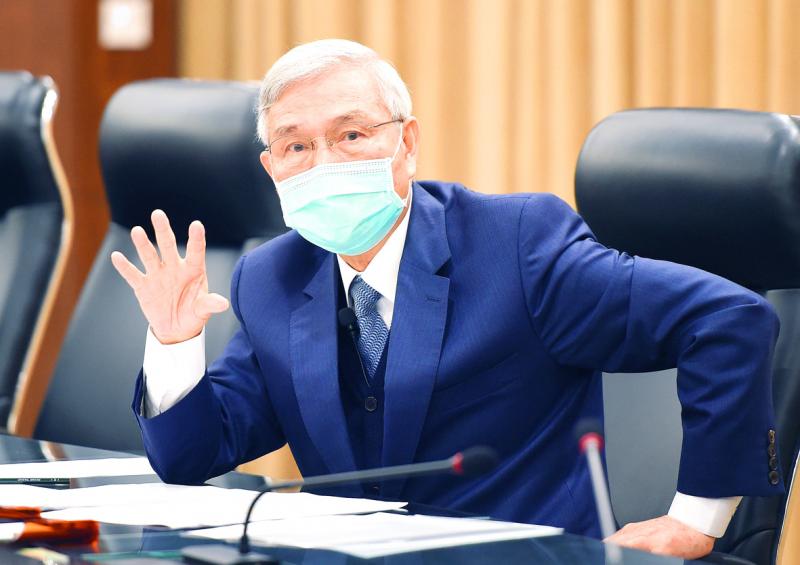The central bank yesterday tightened credit controls for real-estate financing after verbal warnings failed to rein in property price hikes linked to capital repatriation and loose lending.
It is the first time in a decade that the monetary policymaker has implemented credit controls directed at multiple homebuyers, land financing and lending for unsold houses.
Starting today, the loan-to-value (LTV) ratio would be capped at 60 percent for corporate buyers for their first property and drop to 50 percent for their second, the bank said.

Photo: Liao Chen-huei, Taipei Times
No grace period is allowed.
“The measures are targeted at corporate and individual property investors and will not affect first-time homebuyers or people with real demand or relocation needs,” central bank Governor Yang Chin-long (楊金龍) told an unscheduled news conference ahead of the quarterly board meeting on Thursday.
Housing prices have increased noticeably, especially in central and southern Taiwan, although the pace is not as drastic as in 2010, he said.
It is better to act now, if credit controls are necessary to reverse the trend, he added.
For individual buyers, the LTV ratio is set at 60 percent for their third home and no grace period is allowed, Yang said.
The LTV ratio for luxury homes remains unchanged at 60 percent, he added.
Clear and consistent LTV ratios might help banks carry out real-estate financing, as they currently have different standards, making it difficult to regulate, he said.
Some banks offer ultra-low interest rates, while others grant unreasonably long grace periods, it said.
As a result, real-estate lending reached 35.9 percent of banks’ total outstanding loans as of October, close to the historical peak of 37.9 percent, Yang said.
Global low-interest rates have driven some liquidity to the property market, while capital has also lent support, he said.
That explains why housing prices in the proximity of science parks in Hsinchu, Taichung and Tainan have risen, as have housing prices in rezoning areas nationwide, the central bank governor said.
Banks will have to limit land financing to 65 percent of their value and set aside 10 percent loans until after developers produce concrete development plans, Yang said, adding that the restriction is intended to prevent land hoarding.
Banks also have to cap loans for unsold homes at 50 percent of their value to avoid house-hoarding on the part of builders, he said, adding that some companies have overly high inventories.
The central bank would further tighten credit controls if the situation fails to improve, Yang said.

The CIA has a message for Chinese government officials worried about their place in Chinese President Xi Jinping’s (習近平) government: Come work with us. The agency released two Mandarin-language videos on social media on Thursday inviting disgruntled officials to contact the CIA. The recruitment videos posted on YouTube and X racked up more than 5 million views combined in their first day. The outreach comes as CIA Director John Ratcliffe has vowed to boost the agency’s use of intelligence from human sources and its focus on China, which has recently targeted US officials with its own espionage operations. The videos are “aimed at

STEADFAST FRIEND: The bills encourage increased Taiwan-US engagement and address China’s distortion of UN Resolution 2758 to isolate Taiwan internationally The Presidential Office yesterday thanked the US House of Representatives for unanimously passing two Taiwan-related bills highlighting its solid support for Taiwan’s democracy and global participation, and for deepening bilateral relations. One of the bills, the Taiwan Assurance Implementation Act, requires the US Department of State to periodically review its guidelines for engagement with Taiwan, and report to the US Congress on the guidelines and plans to lift self-imposed limitations on US-Taiwan engagement. The other bill is the Taiwan International Solidarity Act, which clarifies that UN Resolution 2758 does not address the issue of the representation of Taiwan or its people in

US Indo-Pacific Commander Admiral Samuel Paparo on Friday expressed concern over the rate at which China is diversifying its military exercises, the Financial Times (FT) reported on Saturday. “The rates of change on the depth and breadth of their exercises is the one non-linear effect that I’ve seen in the last year that wakes me up at night or keeps me up at night,” Paparo was quoted by FT as saying while attending the annual Sedona Forum at the McCain Institute in Arizona. Paparo also expressed concern over the speed with which China was expanding its military. While the US

SHIFT: Taiwan’s better-than-expected first-quarter GDP and signs of weakness in the US have driven global capital back to emerging markets, the central bank head said The central bank yesterday blamed market speculation for the steep rise in the local currency, and urged exporters and financial institutions to stay calm and stop panic sell-offs to avoid hurting their own profitability. The nation’s top monetary policymaker said that it would step in, if necessary, to maintain order and stability in the foreign exchange market. The remarks came as the NT dollar yesterday closed up NT$0.919 to NT$30.145 against the US dollar in Taipei trading, after rising as high as NT$29.59 in intraday trading. The local currency has surged 5.85 percent against the greenback over the past two sessions, central